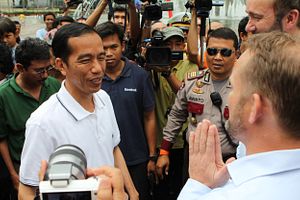Indonesia will conduct presidential elections on Wednesday in what should be its third successful democratic transition of power. The tightening in the polls over the last few months is a testament to the effectiveness of the mudslinging between the two candidates. The third biggest democracy in the world, Indonesia has 188 million registered voters, of whom 67 million are expected to vote for the first time this election. As a developing economy trying to avoid the middle income trap, it hopes to transition away from its dependence on commodity exports and move up the value chain. It is also seeking to protect certain sectors of its economy, and assert a more independent role in the region, particularly in regard to Australia.
An undeniable front runner three months ago, Jakarta Governor Joko “Jokowi” Widodo has let a 30 point lead in the polls evaporate in the final months of the election. His challenger, former special forces chief Prabowo Subianto has taken advantage of the deep pockets of his backers to finance a campaign aimed at raising doubts about the Jakarta governor’s race, and more importantly about Joko’s faith and ethnicity. An Indo Barometer poll from June 29 found that Joko’s lead slipped from 13 points at the beginning of the month to just 3 by the end. Amongst “Muslim voters,” Joko before the campaign had been leading 50 percent to Prabowo’s 37 percent, but the two were now even at 44 percent. Rumors that Joko was in fact a Christian began circulating online in May. He has since battled to show his Muslim faith, going to prayers in the hotly contested West Java province, and traveling to Saudi Arabia early this week on small pilgrimage as a campaign freeze goes into effect in the last few days before the election.
In their final debate this weekend, both candidates made a last attempt to set themselves apart and emphasize their path for Indonesia’s future. However, the issue of domestic beef production highlighted how close the two can be on policy, and how limited any president’s options will be moving forward. Demand has caused prices to increase dramatically, as import quotas have compounded the problem for consumers and Australian exporters. Both candidates favor increasing domestic supply instead of reducing the quotas, as they seek to placate local industry instead of opening Indonesia’s market to more direct competition that would favor consumers, but at a cost of driving out inefficient sectors of the local economy.
A victory by Prabowo is expected to have a more negative effect on the Indonesian market, as he is expected to favor large public projects and institute protectionist policies in the agricultural and financial sectors. However, either candidate will have to make the difficult decision of how to balance the growth of Indonesia’s domestic industries with the need to open up, and pivot to sectors that take advantage the country’s real asset: its huge (and growing) population.

































